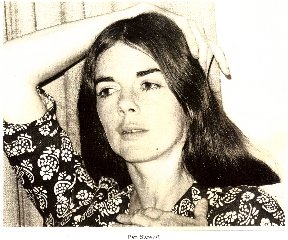Ann Arbor Film Festival kicking off 50th anniversary retrospective series
The Ann Arbor Film Festival is getting a head start on celebrating its 50th season with a “Retrospective Screening Series,” presented in five installments at the Michigan Theater September through February. Five guest curators will present influential or rare independent films that have been shown at the festival over the years.
“Turning 50, the AAFF occupies this great place within film culture,” says program director David Dinnell. “It’s one of the longest-running and largest festivals for avant-garde and experimental film. The festival has a rich history of people who have shown their work here and the kinds of screenings we’ve had. We obviously can’t give a definitive explanation of what 50 years means to everyone, but the retrospective series gives people five different perspectives on our history.”

Feminist and experimental filmmaker Alice Anne Parker (aka Anne Severson) in 1972
“I think what is interesting about “Near the Big Chakra” is that it’s not erotic. It’s not a sexualized portrayal. But at the same time, it’s not clinical like medical or educational images. It comes from this curious place where we’re not quite familiar or comfortable with our own bodies and knowing what different genitalia really look like,” Dinnell says.
Although Parker only made six films between 1969 and 1974, her small collection of works left their mark on feminism, discussions about gender and how people react to the nude body, and 20th-century experimental film history. She will show five of them at the event: “I Change I Am the Same,” “Riverbody,” “Introduction to Humanities,” “The Struggle of the Meat,” and the infamous short “Near the Big Chakra.”
Parker will present the films in person at the event, and U-M art professor and performance artist Holly Hughes will interview her about their significance before allowing the Michigan Theater audience to ask her their own questions.
Parker has also selected three short films from AAFF history created by her peers to show along with her films: “Take Off (1972)” by Gunvor Nelson, “The Off Handed Jape...and How to Pull it Off (1968)” by Robert Nelson and William T. Wiley, and “Best of May, 1968 (1972)” by Jay Cassidy.
“For me, her films still hold a lot of power in 2011,” Dinnell says. For example, “Near the Big Chakra” is one of those uncommon, rare films that gives the audience an opportunity to gauge where society is at—how people react to images of the female body, especially female genitalia. The reception of the work may have changed with time.”
Another of her films, "Riverbody," won at the festival in 1970. Dinnell says, “It’s a really beautiful work. It’s this continuous dissolve between female and male bodies, and the sound is the sound of running water. It’s a really sensory-oriented, experiential film.”
Festival director Donald Harrison does not expect the screening to provoke a disturbance in 2011, but instead he is looking forward to seeing how Parker’s films will impact a contemporary audience. “I’m curious about what the experience will be for people watching them now in this era, especially anyone who was at the festival back in 1972,” he says. “For me, not only is it exciting to show the films but I’m looking forward to having the filmmaker here with us to have a conversation about her work with different generations present.”
The monthly series will continue on Oct. 20 with archival films selected by Mark Toscano, a film preservationist for the Academy of Motion Pictures Arts and Sciences. On Nov. 30, filmmaker David Gatten presents short films he has selected from the festival’s past. Jan. 25, 2012, filmmaker Mike Hoolboom shows his picks. And Robert Gardner will screen a restored version of his feature-length documentary “Forest of Bliss,” on Feb. 22, 2012.
Harrison says that the retrospective is “part of a greater effort to preserve, organize, present the history of the film festival, and then create special opportunities for people to engage with the films,” he says. He mentions two archival projects that will preserve AAFF’s history. On Oct. 13, festival members will be invited to celebrate AAFF’s permanent collection at the U-M Bentley Historical Library, and an online archive of materials is planned to be launched by the Ann Arbor District Library in 2012.
The first screening takes place at 7:30 p.m. Thursday at the Michigan Theater, 603 E. Liberty St. Tickets are $10 general; $7 students/seniors/Michigan Theater members; $5 AAFF members.

